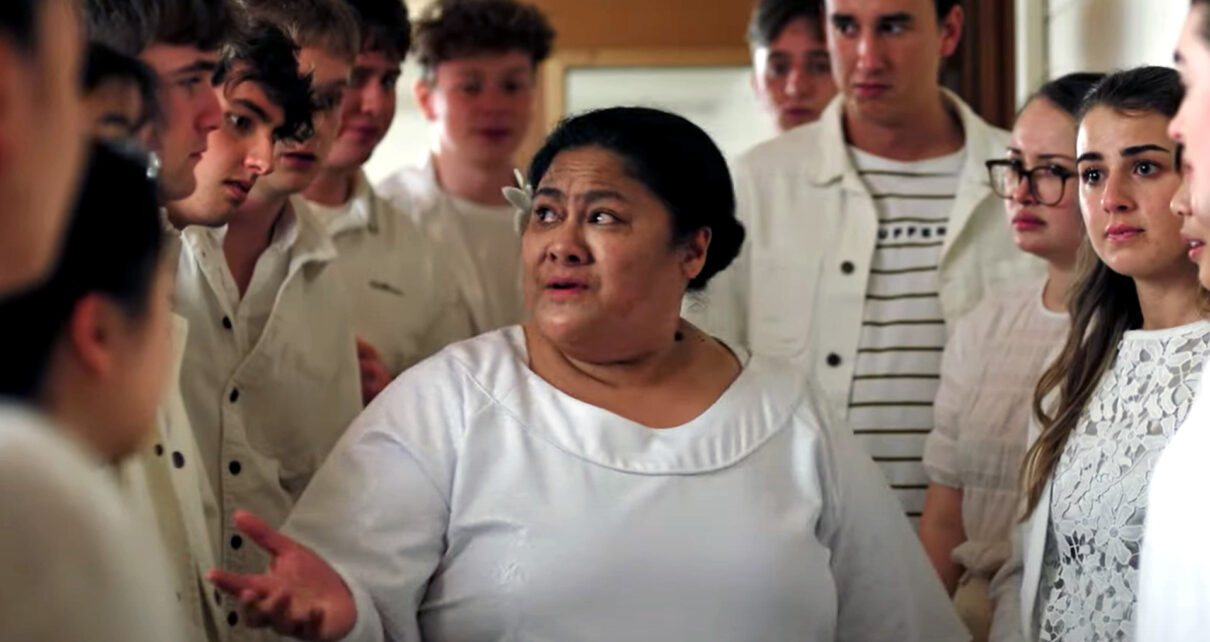You mean there is a New Zealand filmmaker who is neither Peter Jackson nor Taika Waititi? Who knew? Wait. Is this another “whale” film? That’s it, right? Tinā is clearly the name of some Oceania Free Willy, right? No!
Huh. Well, I’ll be.
Welcome to St. Francis Academy in Christchurch, New Zealand, where “average isn’t acceptable,” which is a much easier school motto when your school has funding. While the school isn’t exactly lily-white, it’s demographics scream “PRIVILEGE,” hence accepting its first Samoan teacher is something of a revelation.
Mareta Percival (Anapela Polata’ivao – say that five times fast) doesn’t really want the job. Three years ago, she lost a talented daughter in a huge earthquake. She hasn’t been herself, a mother (or “Tinā”) to anyone since. Her interview speech is not dissimilar from the one that gets Morgan Freeman out of prison, finally, in Shawshank Redemption.
On the way out, however, she encounters Sophie (Antonia Robinson), a talented musician with a permanently damaged left hand. The hand is keeping Sophie from playing properly – luckily, there’s a grand piano hanging out in the courtyard—so Mareta takes up the instrument while Sophie sings, appropriately- “Don’t Dream It’s Over.” Mareta’s champion, a headmaster on his way out, spies this and thinks Mareta could be Tinā now to a bunch of spoiled white kids.
Is this New Zealand’s answer to Dangerous Minds? Hardly. However, Mareta soon realizes she’s little  more than window dressing for a school which boasts diversity without really promoting it. This is all good and fine until Mareta sees Sophie wasting her musical gift, and immediately decides to form a school choir.
more than window dressing for a school which boasts diversity without really promoting it. This is all good and fine until Mareta sees Sophie wasting her musical gift, and immediately decides to form a school choir.
It is unclear why the students want such. It is also unclear why the students don’t rebel immediately after Samoan instruction and burpees for undisciplined behavior, but, thankfully, they don’t. We want to see how Tinā turns a bunch of snotty white kids into a decent chorale. And we want to see her find a reason to live, which she has clearly lacked since the death of her own daughter.
Tinā felt fairly paint-by-numbers, differed not significantly from Dead Poets Society, reminds one a great deal of “Glee,” and bordered on cultural appropriation -which is odd for a film attempting to do exactly the opposite. And yet, Tinā was, indeed, engaging, entertaining, and sporadically delightful. I can’t say this film deserves any awards, but I can think of about 1,000 worse ways to spend a night with family.
There once was a woman from Samoa
Who didn’t give a lick any mo’-a
Her child had died
And for years she cried
Until fate once again opened that do’-a
Not Rated (PG-ish?), 124 Minutes
Director: Miki Magasiva
Writer: Miki Magasiva
Genre: You little snots are gonna start appreciating Maori culture now, dammit!
Type of being most likely to enjoy this film: Fans of diversity
Type of being least likely to enjoy this film: The kind of people who shed blood to make sure white people always stay in charge



